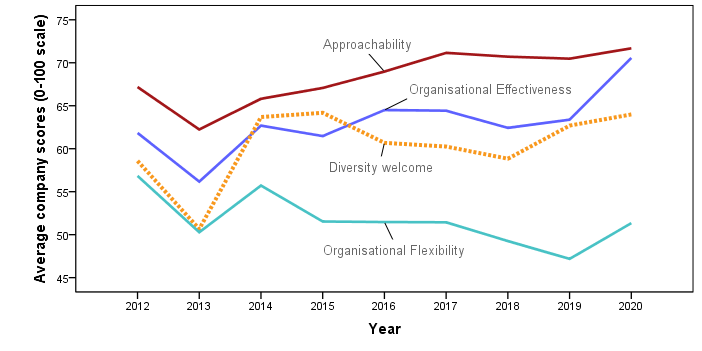07.10.2020
AI, recruitment and organisational culture
In a recent article from MIT, researchers focused on what precisely caused people to connect with their organisation´s culture – the words used, or the actions experienced, and no surprise, actions count more than words. This research is also backed up by our own research, done annually among some 200 organisations. In a trend analysis looking at the development of organisational culture among a sample of 255 organisations from 20+ countries we analysed between 2012 and 2020, we get the following graph:

What stands out? Specifically the topic of organisational flexibility. Why is this? It seems the general trend among organisations is to become more and more strict, in order to deal with a more unpredictable future. Covid however seems to have (temporarily?) reversed this trend, as we can see by the upswing in more flexibility in 2020.
Why is this important in Finland and for Finnish employers? The Finnish labour market, with its collective bargaining principles is notoriously inflexible (for larger employers) – this has the consequence that Finnish organisations, and especially Finnish HR, are more preoccupied with following rules than they are with looking at modernising HR labour laws and with that HR practices.
The consequence of this reactive behaviour can be seen in recruitment practices in Finland. Practices which were aimed at enabling an equal playing field are causing an overwhelmingly negative experience (article in Finnish) for non-Finnish job seekers.
What is the consequence of this for AI? In general, the type of AI currently being used in recruitment pilots is the type of AI where humans have been responsible for “labelling” and “feeding” the learning algorithms what to look for in e.g. cv´s. In other words, the “AI” is only as smart as the coders. With most coders being overwhelmingly male – you will already get the use of gender value biases engrained in the recruitment process. For example, in the tech world very often you get the words “ninja, scrum master, etc” – words which tend to trigger more interest in men than women. Another bias is cultural bias – labels coded by Finnish coders risk to place more “search value” on Finnish behavioural traits which are seen as positive in Finland (e.g. be modest, or tech skills) and negative outside Finland (inability to praise yourself is seen as being insecure in other cultures, and tech skills are of lesser values if you can´t communicate what you are trying to say).
So, is there a point to using AI? Probably, at some point. But in my honest opinion, as long as in the world of work we are not able to understand (or choose to neglect) the software of the mind (human values and how these differ across cultures) – there is no sense in letting machines take over this task.
What does all of the above mean for you, as HR professional?
1. Make sure you thoroughly understand what is the organisational culture of your organisation
2. Make sure you are thoroughly aware of your own value preferences and how these colour your perception
3. Make sure that whichever search algorithm you are using – the algorithms take cultural coding into account – other you risk loosing out on an enormous talent pool
Tools such as e.g. a new Finnish start-up, Clicqnet***, are aimed at doing precisely this, looking at how, specifically for the tech sector, specific value preferences on an individual level match with the working practices in a team – bypassing existing cultural biases.
Do you want to know more about how we make culture tangible, please do reach out for a personal discussion.
Egbert Schram
Egbert Schram is a Dutchman, residing in Finland. He acts as the Group CEO of Hofstede Insights, a global cultural advisory, advising individuals, organisations and governments on the impact of culture on work life. Currently having operations in 60+ countries, and a global practice of about 150 people (of which 93% outside of Finland).
***Hofstede Insights is a shareholder in Clicqnet

